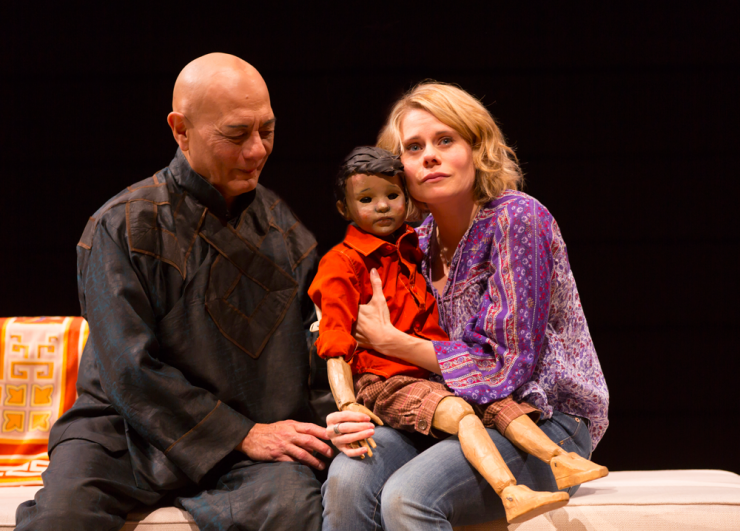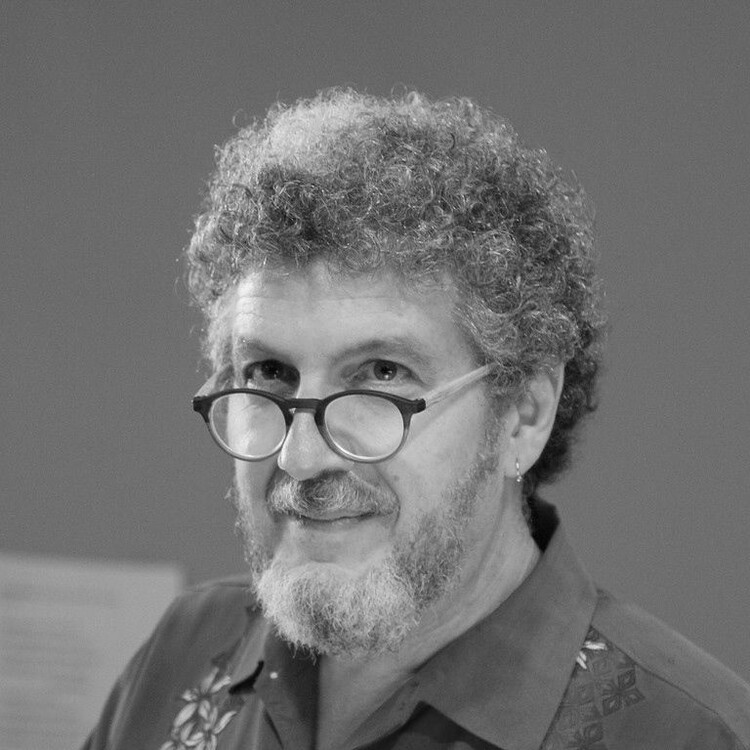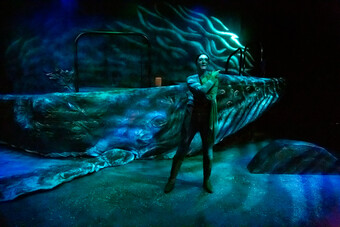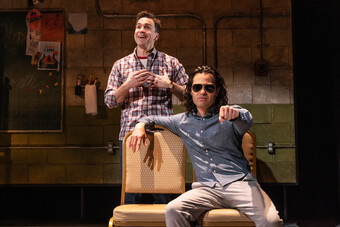A Lover's Guide to American Playwrights
Sarah Ruhl
I'm holding a photograph from sometime in the 1950s, the heart-stopping addendum to Sarah Ruhl's For Peter Pan on her 70th Birthday. It's a picture of Sarah's mom as a teenager, posing backstage with Mary Martin. They're in Martin's dressing room, and the star is still wearing Peter Pan's ivy chamo. Kathy, the woman who will be Sarah Ruhl's mother, wears the knowing smile of Davenport, Iowa's own reigning Peter Pan. Their arms are flung wide—not akimbo, the way Peter's are always described—and their heads are tipped back. Kathy looks straight into the camera and catches our eyes and, unknowingly, across many years, her daughter's eyes. One day, decades later, that daughter will write her a gift.
I've always loved J.M. Barrie's description of Mrs. Darling tidying up her children's minds while they sleep in the nursery, the way one tidies drawers, "Repacking into their proper places the many articles that have wandered during the day." It's there Mrs. Darling first hears of Peter, and it's there we learn of the Neverland. Maybe Sarah works this way, too, rummaging in our almost-dreams, collecting stray articles—a family joke, some letters, the scrap of a song. Maybe she finds these stray bits of life and boxes them up as gifts, as plays.
For all her lightness, Sarah is a tough one, a most graceful artist with an adamant core.
"I wanted music yes," the Sara writes in an anniversary book of poems to her husband Tony,
but I also wanted the music
of every day things
a plate an arm some dirt a chair
The music she wants is "the music of combustible objects."
In the great green room
there was a telephone
And a red balloon
And a picture of—
The cow jumping over the moon
and there were three little bears, sitting on chairs
and two little kittens and a pair of mittens
and a little toy house and a young mouse
and a comb and a brush and bowl full of mush
and a quiet old lady who was whispering "hush"
Sarah didn’t write Goodnight Moon, but I think about her when I read it. I think about Sarah because there is something in the cadence of that children's classic, something in its simplicity and precision of detail, something in the understated tone of the noticing, something curious and kind, melancholy and delighted that sounds like a Sarah Ruhl play. Something cozy and bedtime-y rocking chair-ish—made up of things you thought you knew made suddenly astonishing.
Listen to this, from Dead Man’s Cell Phone. We are in a stationary store. Dwight and Jean have just met, when Jean is invited to dinner with the family of a dead stranger whose cell phone she answered and pocketed at the moment of his death. Dwight and Jean met and, as often happens in Sarah Ruhl plays, fell instantly in love.
Jean and Dwight are touching embossed invitations, closing their eyes.
JEAN:
Feel this one Like a leaf.Dwight feels it.
JEAN:
This one. Branches. Tablecloths. Wool.She passes it to Dwight.
JEAN:
This one is my favorite, though. I’d like to live in a little house made of this one.She passes it to Dwight.
DWIGHT:
A house made of paper.Dwight tries to build a little house out of the paper.
JEAN:
Yeah.
And this one! Braided hair.
And a comb and a brush and a bowl full of mush.
Or this, from The Clean House:
VIRGINIA:
I have my house cleaned by approximately 3:12 every afternoon. I have folded the corner of every sheet. The house is quiet. The gold draperies are singing a little lullaby to the ottoman. The silverware is gently sleeping in its box. I tuck in the forks, the spoons, the knives. I do not have children.
“I do not have children.” The sad kicker at the end. "And a quiet old lady who was whispering hush."
I have always found Goodnight Moon a bit sad, or maybe just ominous. It's mournful and eerie to take leave of the day and give yourself over to that afterlife called sleep and who knows what kind of strange dreams. It reminds me of the letter in Sarah's Eurydice, sent to Eurydice on her wedding day by her dead father, full of the chipper atmospherics of life in Hades:
…This is what it's like being dead: The atmosphere smells.
And there are strange high pitched noises—like a tea kettle always boiling over. But it doesn't seem to bother anyone. And, for the most part, there is a pleasant atmosphere and you can work and socialize, much like at home.
Saying goodnight is by its nature sad, and sad may be Sarah's favorite word. I defy you to find anything by her that doesn’t have sad in it, despite how friendly that sadness sounds. I defy you to find something that isn’t kind of happy and sad at the same time.
“Do you think we make sad things into songs in order to hold onto the sadness or to banish it?” Mrs. Givings asks in The Vibrator Play. She answers her own question: “I think it is to banish the sadness. So then if you write a happy song, is it not sadder than a sad song because by making it you have banished your own happiness into a song? What do you think?” What do we think? Sarah is master of the easy question that's really hard.
I don't mean to suggest that Sarah lives in the nursery with the Darling children or The Runaway Bunny. But she knows that childhood shapes world events with a vengeance, even among the powerful. More, she is a deeply literary writer, and what this gentle literary pilferer peruses, she uses. She reads Shakespeare and re-dreams his romances; she reads Woolf and time travels with Orlando. She makes a play from the letters of Robert Lowell and Elizabeth Bishop. And from all those parenting guides and the raft of books on Tibetan Buddhism, she tests theories of attachment parenting against Buddhist principles of non-attachment.

“I read a book today,” Eurydice tells her beloved Orpheus.
ORPHEUS:
Did you?EURYDICE:
Yes. It was very interesting.ORPHEUS:
That’s good.EURYDICE:
Don't you want to know what it was about?ORPHEUS:
Of course.EURYDICE:
There were—stories—about people’s lives—how some come out well—and others come out badly.ORPHEUS:
Do you love the book?EURYDICE:
Yes—I think so.
Like the paper house in the stationary store in Dead Man’s Cell Phone or the room of string Eurydice's father constructs for her in Hades, Sarah builds her plays out of the most un-dramatic ephemera: the joke; the epistle; the stage kiss; a piece of Jewish lore heard on NPR. She's fascinated by things that slip away, that change and get lost. Our lives, in the world of Ruhl, are a melancholy passage or, as she writes in Melancholy Play, a “necessary mourning—
due to things that grow and pass—
rice, the moon, wheat, childhood, fingernails—
men’s hats, tides on a marsh, corsages,
typewriters, spectacles…
Plays like Sarah's are illumination gifts in dark hours. They help us bear up.
Sarah may be a connoisseur of loss's melancholy, but she's also a master of ways we get found. A woman answers a dead man’s cell phone and so finds a life. A doctor and his terminally ill patient find in each other their soul mates. Three women find their way through Victorian straitjacketing to their bodies. Or like Eurydice, we remember ourselves.
For all her lightness, Sarah is a tough one, a most graceful artist with an adamant core. She has increasing turned her powerful light touch to political horrors—Nazism or state sanctioned violence or genocide. She translates world politics into the domestic sphere and back. She keeps her sights trained on both. Sarah repeats a central obsession in a couplet from "Miscarriage" and in the voice of Laura Bush in Scenes from Court Life: "women bleed in private like animals/men bleed in public like kings."
One last example. It’s the end of the second part of Passion Play, as the Nazi soldier Eric prepares to take the young Jewish girl Violet away, presumably to her death. He’s known the girl for most of his life in Oberammergau, where townspeople have enacted the story of Christ for centuries. Think of Violet as our unruly Ruhl, serving up questions, fairy tales, games, anything to recall the boy to himself, to make him change his course:
ERIC
We need to go.VIOLET:
Let's play a game. It's called would you rather. Would you rather kill a dog or kick a baby?ERIC:
How hard would I have to kick the baby?VIOLET:
So hard that her head was dented.ERIC:
Kill a dog, I guess.VIOLET:
Would you rather be deaf or poke someone in the ear-drum with a needle so that they became deaf? It's a hard one, isn't it?Eric nods.
ERIC:
Poke someone in the ear-drum, I suppose. It would be terrible to be deaf. I love music. Come on, now. We don't have time for games.VIOLET:
Please, before you take me, tell me just one story. Tell me the story of little red riding hood.ERIC:
Well, there was a little girl, wasn't there? She went to visit her grandmother, and her grandmother was a wolf. The wolf ate the little girl.VIOLET:
Yes—that's right. [...]ERIC:
Will you come with me now?VIOLET:
I always liked you. You don't have a jolly fat face like the other villagers—you always looked a little bit sad.ERIC:(If the struggle against evil could be contained in one commonplace phrase, “thank you” is the only one allowed to Eric for the moment.)
Thank you.A pause.
He extends his hand to take her away.VIOLET:
Wait. Right now—it's not like being in a play—no one's watching—you could do something different.
This, to me, is a summation, the statement of the freedom and the strength of the artist in the world: “You could do something different.”
In an essay on "Calvino and Lightness" that she didn't have time to write, Sarah asks: "...What if lightness is a philosophical choice to temper reality with strangeness, to temper the intellect with emotion, and to temper emotion with humor? Lightness is then a philosophical victory over heaviness."
I have felt so very heavy these past days, heavy with the weight of history, with the thick, ominous clouds of the foreseeable future. I want a force of lightness to counter the gathering storm. I want to remember that storms come and go, that presidents come and go, and that all history can in time find its way to the stages of community theatres.
Plays like Sarah's are illumination gifts in dark hours. They help us bear up. They travel across time to remind us that somewhere in a dressing room in Iowa two Peter Pans once met and flung out their joyful arms, that one of them caught her daughter's eye across fifty years. She caught her daughter's eye, and this time her daughter flew.
On the occasion of the Harold and Mimi Steinberg Distinguished Playwright Award, granted to Sarah Ruhl, November 14, 2016. Read her remarks from the event.












Comments
The article is just the start of the conversation—we want to know what you think about this subject, too! HowlRound is a space for knowledge-sharing, and we welcome spirited, thoughtful, and on-topic dialogue. Find our full comments policy here
Turning to Ruhl to bear up. yes. such an eloquent and loving tribute to a woman - a playwright - who captures our imaginations and our memories with such grace.
A beautiful essay, and a beautiful reminder of how art can help to lift us out of the morass maybe even for long enough to get a view of the terrain from a different vantage point. Thank you!
Lovely. Luminous. Thank heaven for our playwrights. And writers like you who call out their bright notice of our need.
Oh, Todd, such a gorgeous tribute. As always, incisive, eloquent, wry and uncanny in your ability to meet the work and the writer at the sweet spot of truth.